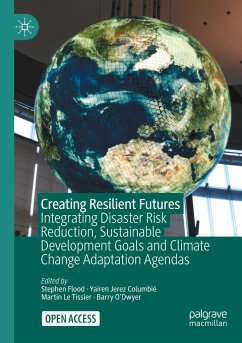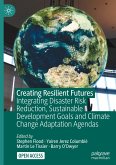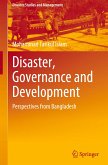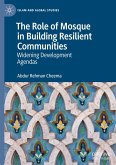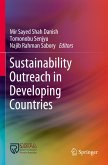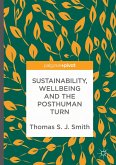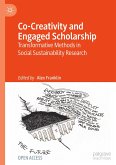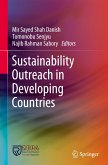Creating Resilient Futures
Integrating Disaster Risk Reduction, Sustainable Development Goals and Climate Change Adaptation Agendas
Herausgegeben:Flood, Stephen; Jerez Columbié, Yairen; Le Tissier, Martin; O'Dwyer, Barry
Creating Resilient Futures
Integrating Disaster Risk Reduction, Sustainable Development Goals and Climate Change Adaptation Agendas
Herausgegeben:Flood, Stephen; Jerez Columbié, Yairen; Le Tissier, Martin; O'Dwyer, Barry
- Broschiertes Buch
- Merkliste
- Auf die Merkliste
- Bewerten Bewerten
- Teilen
- Produkt teilen
- Produkterinnerung
- Produkterinnerung
This open access edited volume critically examines a coherence building opportunity between Climate Change Adaptation, the Sustainable Development Goals and Disaster Risk Reduction agendas through presenting best practice approaches, and supporting Irish and international case studies. The Covid-19 pandemic has highlighted existing global inequalities and demonstrated the scope and scale of cascading socio-ecological impacts. The impacts of climate change on our global communities will likely dwarf the disruption brought on by the pandemic, and moreover, these impacts will be more diffuse and…mehr
Andere Kunden interessierten sich auch für
![Creating Resilient Futures Creating Resilient Futures]() Creating Resilient Futures39,99 €
Creating Resilient Futures39,99 €![Disaster, Governance and Development Disaster, Governance and Development]() Mohammad Tarikul IslamDisaster, Governance and Development85,99 €
Mohammad Tarikul IslamDisaster, Governance and Development85,99 €![The Role of Mosque in Building Resilient Communities The Role of Mosque in Building Resilient Communities]() Abdur Rehman CheemaThe Role of Mosque in Building Resilient Communities93,99 €
Abdur Rehman CheemaThe Role of Mosque in Building Resilient Communities93,99 €![Sustainability Outreach in Developing Countries Sustainability Outreach in Developing Countries]() Sustainability Outreach in Developing Countries100,99 €
Sustainability Outreach in Developing Countries100,99 €![Sustainability, Wellbeing and the Posthuman Turn Sustainability, Wellbeing and the Posthuman Turn]() Thomas S. J. SmithSustainability, Wellbeing and the Posthuman Turn43,99 €
Thomas S. J. SmithSustainability, Wellbeing and the Posthuman Turn43,99 €![Co-Creativity and Engaged Scholarship Co-Creativity and Engaged Scholarship]() Co-Creativity and Engaged Scholarship39,99 €
Co-Creativity and Engaged Scholarship39,99 €![Sustainability Outreach in Developing Countries Sustainability Outreach in Developing Countries]() Sustainability Outreach in Developing Countries100,99 €
Sustainability Outreach in Developing Countries100,99 €-
-
-
This open access edited volume critically examines a coherence building opportunity between Climate Change Adaptation, the Sustainable Development Goals and Disaster Risk Reduction agendas through presenting best practice approaches, and supporting Irish and international case studies. The Covid-19 pandemic has highlighted existing global inequalities and demonstrated the scope and scale of cascading socio-ecological impacts. The impacts of climate change on our global communities will likely dwarf the disruption brought on by the pandemic, and moreover, these impacts will be more diffuse and pervasive over a longer timeframe. This edited volume considers opportunities to address global challenges in the context of developing resilience as an integrated development continuum instead of through independent and siloed agendas.
Produktdetails
- Produktdetails
- Verlag: EU Interreg NPA Project / Palgrave Macmillan / Springer International Publishing / Springer, Berlin
- Artikelnr. des Verlages: 978-3-030-80793-1
- 1st ed. 2022
- Seitenzahl: 280
- Erscheinungstermin: 1. November 2021
- Englisch
- Abmessung: 210mm x 148mm x 16mm
- Gewicht: 366g
- ISBN-13: 9783030807931
- ISBN-10: 3030807932
- Artikelnr.: 62020660
- Herstellerkennzeichnung Die Herstellerinformationen sind derzeit nicht verfügbar.
- Verlag: EU Interreg NPA Project / Palgrave Macmillan / Springer International Publishing / Springer, Berlin
- Artikelnr. des Verlages: 978-3-030-80793-1
- 1st ed. 2022
- Seitenzahl: 280
- Erscheinungstermin: 1. November 2021
- Englisch
- Abmessung: 210mm x 148mm x 16mm
- Gewicht: 366g
- ISBN-13: 9783030807931
- ISBN-10: 3030807932
- Artikelnr.: 62020660
- Herstellerkennzeichnung Die Herstellerinformationen sind derzeit nicht verfügbar.
Stephen Flood has over 12 years' experience in climate change, environmental policy and social science research. His research interests include climate information platforms, serious games, climate adaptation implementation, resilience and systems thinking, coastal management, vulnerability assessment and hazard management. He has worked as a Postdoctoral Fellow at the Climate Change Research Institute at Victoria University of Wellington in New Zealand, as an Environmental Social Science Researcher at Landcare Research also in Wellington (2016 to 2018) and as a Senior Postdoctoral Scientist at the SFI Ireland Centre for Energy, Climate and Marine Research and Innovation (MaREI), at University College Cork. He is currently based at the Irish Climate Analysis and Research Units (ICARUS), Department of Geography, Maynooth University, working on a range of projects focused on various aspects of climate change adaptation and resilience. Yairen Jerez Columbié is an Assistant Professor in Latin American Studies and Intercultural Communication at Trinity College Dublin, where she investigates cultural exchange, postcolonial ecologies and the sociohistorical and cultural dimensions of environmental challenges. Her work focuses on marginalised knowledge, cultural exchanges, postcolonial socio-ecological systems and ecocritical approaches in Latin America, the Caribbean and the Atlantic World. She has also carried out interdisciplinary work at the SFI Ireland Centre for Energy, Climate and Marine Research and Innovation (MaREI) and lectured at the Department of Spanish Portuguese and Latin American Studies at University College Cork. She is the author of the monograph Essays on Transculturation and Catalan-Cuban Intellectual History (Palgrave Macmillan 2021) Martin Le Tissier is the lead PI for the Identifying Interactions for SDG Implementation in Ireland (SDGs4IIII) and Achieving Resilience in the Marine and Coastal Environment of Ireland (BCOMER) projects funded by the EPA based at MaREI. Martin's work has a strong focus on education and professional training with institutional development. He has practical experience to develop capacity building and institutional strategic responses to adaptation to climate change, coastal development, and management, as well as developing and implementing participatory approaches to developing coastal resources and livelihoods. Martin is the author of over 50 peer-reviewed journal articles, book chapters/ editor and consultancy reports. Barry O'Dwyer has worked in the area of climate change science, policy and practice for over a decade. Barry is leading the development and delivery of the EPA/DCCAE-funded Climate Ireland Programme, recognised as Ireland's key national resource for climate change adaptation information. Barry also leads the Climate Change Impacts and Adaptation Group at MaREI. Barry acts as principal investigator on a wide range of nationally and internationally funded research projects which address the science of climate change and adaptation with a particular focus on developing fit-for-purpose decision making tools and supports for adaptation planning. Barry has a wide range of experience working with local and sectoral decision makers in Ireland and has supported the development of Local and Sectoral Guidelines for Planning for Climate Change Adaptation.
1 Introduction: Can the Sendai Framework, The Paris Agreement, and Agenda 2030 provide a path towards resilience?.- Section 1 Best practice approaches.- 2 Why making connections through resilience indicators matters?.- 3 Coherence, alignment and integration: Understanding the legal relationship between sustainable development, climate change adaptation and disaster risk reduction.- 4 Bridging gaps: connecting climate change risk assessments with disaster risk reduction and climate change adaptation agendas.- Section 2 Irish case studies.- 5 Enhancing Integration of Disaster Risk and Climate Change Adaptation into Irish Emergency Planning.- 6 Supporting national climate change action in Ireland through local governance networks.- 7 Mainstreaming climate change adaptation into planning and development: A case study example from Northern Ireland.- Section 3 International case studies.- 8 Sustainability, disaster risk reduction and climate change adaptation: Building from the bottom up - ASouth African perspective from the small-scale fisheries sector.- 9 Adapting to climate change through disaster risk reduction in the Caribbean: lessons from the Global South in tackling the Sustainable Development Goals.- 10 Towards a resilient riverine community: A Case Study in Sadong Jaya, Sarawak, Malaysia.- 11 Reimagining our menu for sustainable development.
1 Introduction: Can the Sendai Framework, The Paris Agreement, and Agenda 2030 provide a path towards resilience?.- Section 1 Best practice approaches.- 2 Why making connections through resilience indicators matters?.- 3 Coherence, alignment and integration: Understanding the legal relationship between sustainable development, climate change adaptation and disaster risk reduction.- 4 Bridging gaps: connecting climate change risk assessments with disaster risk reduction and climate change adaptation agendas.- Section 2 Irish case studies.- 5 Enhancing Integration of Disaster Risk and Climate Change Adaptation into Irish Emergency Planning.- 6 Supporting national climate change action in Ireland through local governance networks.- 7 Mainstreaming climate change adaptation into planning and development: A case study example from Northern Ireland.- Section 3 International case studies.- 8 Sustainability, disaster risk reduction and climate change adaptation: Building from the bottom up - ASouth African perspective from the small-scale fisheries sector.- 9 Adapting to climate change through disaster risk reduction in the Caribbean: lessons from the Global South in tackling the Sustainable Development Goals.- 10 Towards a resilient riverine community: A Case Study in Sadong Jaya, Sarawak, Malaysia.- 11 Reimagining our menu for sustainable development.

